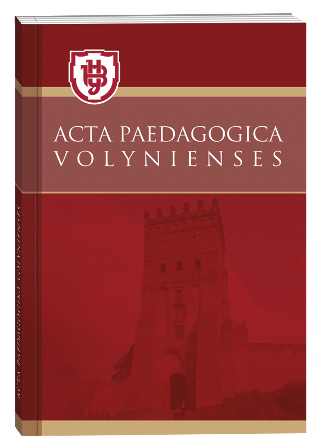WAYS OF FORMING EMOTIONAL LITERACY IN OLDER PRESCHOOL CHILDREN WITH SPEECH DISORDERS
DOI:
https://doi.org/10.32782/apv/2024.1.12Keywords:
emotional literacy, psychological of readiness, children of older preschool age, children with speech disorders, methods, techniques.Abstract
The scientific publication carried out a theoretical and experimental analysis of the formation of the emotional component of the psychological component of the speech readiness of older preschool children to study in general secondary education institutions. The purpose of the study is to determine the effective ways of educational and developmental work to form the emotional literacy of older preschool children with speech disorders, which will ensure their successful adaptation in the conditions of general secondary education institutions. Research methods: theoretical: systematization of scientific and theoretical sources to substantiate the conceptual position and idea regarding the solution of the problematic issue; empirical: the use of various psychological methods, which are interdependent and complement each other during the formation of the emotional component: conversation, observation, method of analysis, comparison; data processing methods: included variable-statistical description. Research results. The revealed low indicators of the actual development of the emotional component of the psychological component of speech readiness in older preschool children with speech disorders raised questions about the justification of the ways of educational and developmental work aimed at the formation of emotional literacy. The main methods are outlined, such as game, which includes didactic, respiratory, motor, auditory, visual, tactile developmental games; the verbal method, which provides an interactive method, implemented with the help of conversation, stories, readings of works of art, parables, etc.; the visual-verbal method is used in art therapy, namely while drawing, listening to music, watching cartoons, etc. Methods of educational and developmental work and the expected result of the child are determined. In the process of educational and development work, considerable attention was paid to the formation of the ability to decipher emotional patterns, read facial expressions, identify emotions in life situations, and show positive emotions during communication. Accordingly, the indicators of the comparative analysis (declarative and formative experiments) proved that the emotional literacy of older preschool children with speech disorders was formed in a significant majority of respondents. That confirmed the effectiveness of training and development work.
References
Бєлова О. Б. Актуальний стан сформованості емоційної грамотності дітей старшого дошкільного віку з логопатологією. Освітологічний дискурс, 2023. 1(40). С. 93−112. https://od.kubg.edu.ua/index.php/journal/article/view/977
Бєлова О.Б. Методика вивчення емоційної грамотності дітей старшого дошкільного віку з логопатологією. Зб. наук. праць «Педагогіка формування творчої особистості у вищій і загальноосвітній школах». Запоріжжя: КПУ. 2022. 82. С. 21–29. https://doi.org/10.32840/1992-5786.2022.82.3
Літковська О. В. 100 притч для тих, хто вчить, і тих, хто вчиться. Київ: Шк. світ, 2012. 224 с.
Портман Р. Ігри, що запобігають агресії: Інтерактивні ігри. Львів: Свічадо, 2010. 112с.
Bahrieva N. A. The growth of speech in preschool children is an important factor in their socio-emotional development. European Journal of Molecular & Clinical Medicine. 2020. 07(09). Р.2282–2292.
Bielova О. The state of development of components of speech readiness of older preschool children with speech disorders. SPECIAL EDUCATION. 2021. 1(42), Р. 137–189. https://www.journals.vu.lt/special-education/article/view/25427
Bielova О. Patterning types of aggressive behaviour of primary school children with speech disorders. SPECIAL EDUCATION. 2019. 2(40). Р. 201–236. http://socialwelfare.eu/index.php/SE
Daily S., Burkhauser M., and Halle T. A review of school readiness practices in the states: Early learning guidelines and assessments. Child Trends. 2010. 1(3). Р. 1-12. https://www.childtrends.org/publications/a-review-of-schoolreadiness-practices-in-the-states-early-learning-guidelines-and-assessments
Dell’Angela L., Zaharia A., Lobel A., Vico Begara O., Sander D., & Samson A. C. Board games on emotional competences for school-age children. Games for Health Journal. 2020. 9(3). Р. 187–196.
Elfenbein H.A, Ambady N. On the universality and cultural specificity of emotion recognition: a meta-analysis. Psychol Bull. 2002.128(2). Р.203−235. doi: 10.1037/0033-2909.128.2.203. PMID: 11931516.
Grosse G., Streubel B., Gunzenhauser C., & Saalbach H. Let’s talk about emotions: The development of children’s emotion vocabulary from 4 to 11 years of age. Affective Science. 2021. 2(2). Р. 150–162.
Ho J. & Funk S. Promoting young children’s social and emotional health. Young Children, 2018. 73(1). https:// www.naeyc.org/resources/pubs/yc/mar2018/promoting-social-and-emotional-health
Laukka P., & Elfenbein H. A. Cross-Cultural Emotion Recognition and In-Group Advantage in Vocal Expression: A Meta-Analysis. Emotion Review. 2021. 13(1). Р. 3–11. https://doi.org/10.1177/1754073919897295
Lee R. L. T., Lane S. J., Tang A. C. Y., Leung C., Louie L. H. T., Browne G., & Chan S. W. C. Effects of an unstructured free play and mindfulness intervention on wellbeing in kindergarten students. International Journal of Environmental Research and Public Health. 2020. 17(15). 5382.
Nakamura T., Munekata N., Nakamura F., Ono T., & Matsubara H. Universal game based on traditional children’s outdoor games. In J. C. Anacleto, S. Fels, N. Graham, B. Kapralos, M. Seif El-Nasr, & K. Stanley (Eds.), Entertainment computing – International Conference on Entertainment Computing. Lecture notes in computer science. 2011. 6972. Р. 59–64.
Nandy A., Nixon E., & Quigley J. Parental toy play and toddlers’ socio-emotional development: The moderating role of coparenting dynamics. Infant Behavior and Development. 2020. 60. Р. 101465.
Streubel B., Gunzenhauser C., Grosse G., & Saalbach H. Emotion-specific vocabulary and its contribution to emotion understanding in 4- to 9-year-old children. Journal of Experimental Child Psychology. 2020. 193. 104790.
Trawick-Smith J. W. Early childhood development: A multicultural perspective (6th ed.). Pearson. 2013. 576р.
Yilmaz R. M. Educational magic toys developed with augmented reality technology for early childhood education. Computers in Human Behavior. 2016. 54. Р.240–248.







